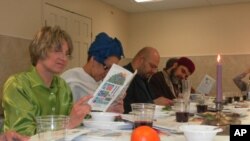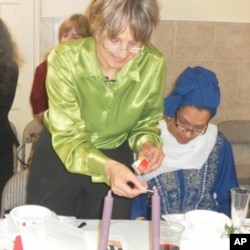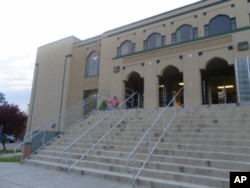Andrea Barron is performing an annual ritual: lighting two candles for a Passover Seder, the ceremonial retelling of the ancient Israelites' exodus from slavery in Egypt more than 3,000 years ago. The traditional elements are all in place - including the Seder plate which holds unleavened bread, green vegetables, bitter herbs and a shank bone.
However, what is unusual about the evening’s Seder is that it is taking place in the basement of the All Dulles Area Muslim Society (ADAMS), a mosque outside of Washington, D.C.
Rizwan Jaka, board member and chair of the interfaith committee at ADAMS, sees it as a natural fit.
“There’s commonality. We all believe in the freedom that’s the message of the exodus, that God saved Prophet Moses and his people from the pharaoh," says Jaka. "The striving for freedom is something that is important for everyone."
It’s the third time the Sterling, Virginia mosque has hosted the event and an air of friendly, mutual respect is evident. Barron arranges the seating so that Muslims and Jews alternate, which results in them sitting next to each other. Before the ceremony, Jaka welcomes participants with the Jewish greeting, “Shalom.”
“This is a large mosque. It is one of the largest mosques in the country. Mohamed Majid, the imam, is the president of ISNA, the Islamic Society of North America,” says Barron, who leads the Seder. “So these are not sort of marginal Muslims. These are mainstream Muslims who are holding a Passover Seder in a mosque.”
ADAMS has 10 branches in the area, serving 5,000 families. Its leaders have publicly condemned terrorism, extremism and violence while working with law enforcement and the FBI. Recent counter-radicalization seminars at ADAMS attracted several hundred people.
During the evening, the group raises a glass – filled with grape juice instead of wine in deference to the Muslims in attendance – to this particular Seder’s three main themes: the struggle for Israeli-Palestinian peace, countering Islamophobia and the struggle of the Arab people for freedom and democracy.
The message is not lost on Kay Halpern, a Jewish woman who attended the event. “It’s very important for Jews and Muslims, Jews and Arabs, including Palestinians, to break bread together and to get to know each because when people know each other as other human beings, they don’t see people in terms of stereotypes and they view the world less in terms of us versus them,” she says.
The universality and timelessness of the Passover message resonate for Egyptian-American participant Mokhtar Kamal. “There are a lot of Arabs who really want democratization. The leadership of the revolution in Egypt, many of them were upper middle class. They didn’t need money. What they needed was freedom.”
Barron’s group, Washington Area Jews for Jewish-Muslim Understanding, has been conducting interfaith events like this one since 2002.
She acknowledges it is a small organization. But her goal is for the message to strike a chord with the larger population of Muslims and Jews, Israelis and Palestinians.
“We support two states based on the 1967 borders. We’re not anti-Israel," she notes. "We’re not anti-Zionist. We are very connected to Israel but we also strongly support Israeli-Palestinian peace. And another important theme…because there’s been so much discrimination against Jews, we think Jews should be in the forefront of countering the hatred that we see growing in our country against Muslims.”
ADAMS’ imam, Mohamed Majid, hopes to make a habit of these kinds of gatherings. In fact, he imagines a reciprocal event during the upcoming month of Ramadan, when an area synagogue might host iftar, the meal for Muslims to break the fast.







